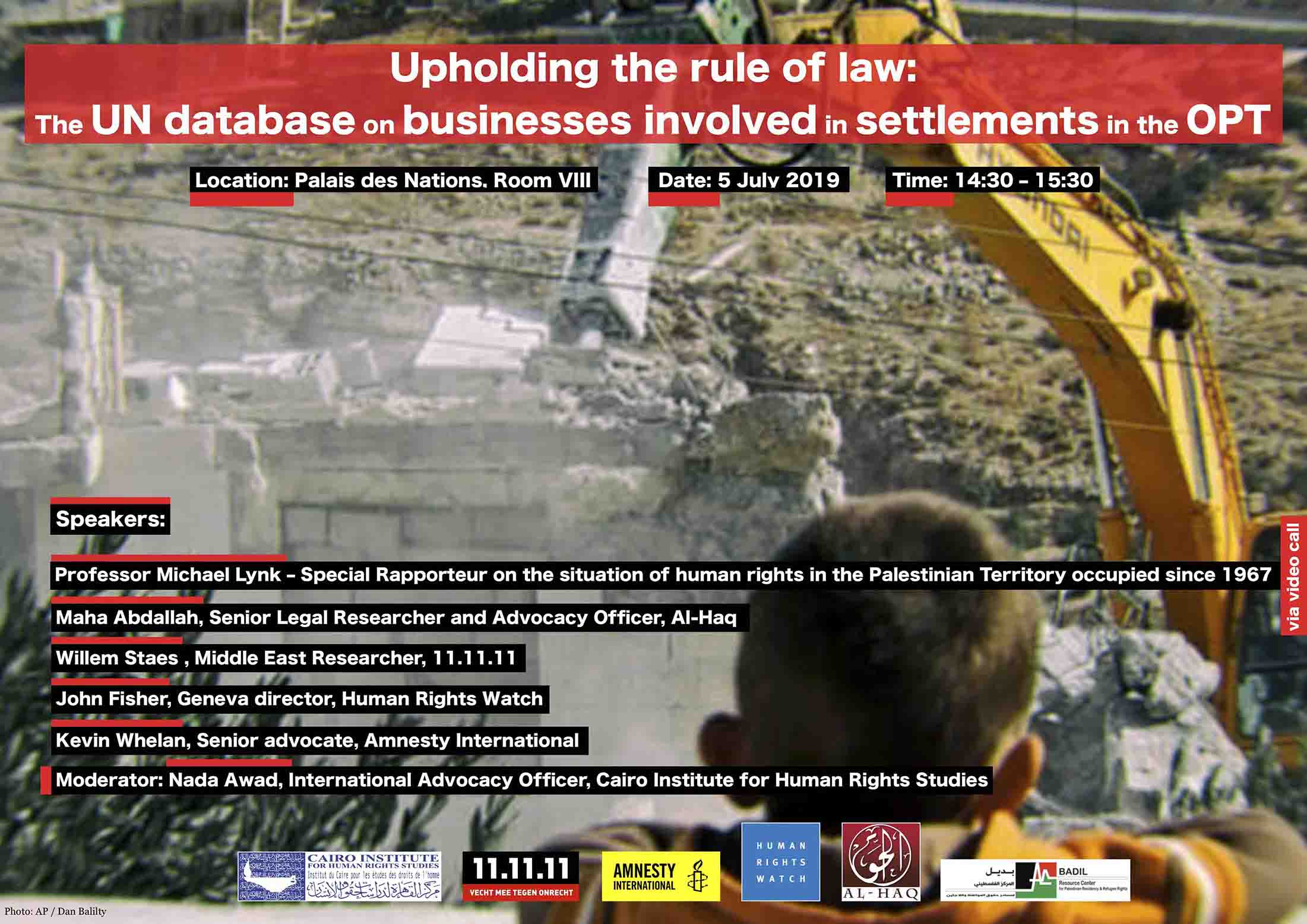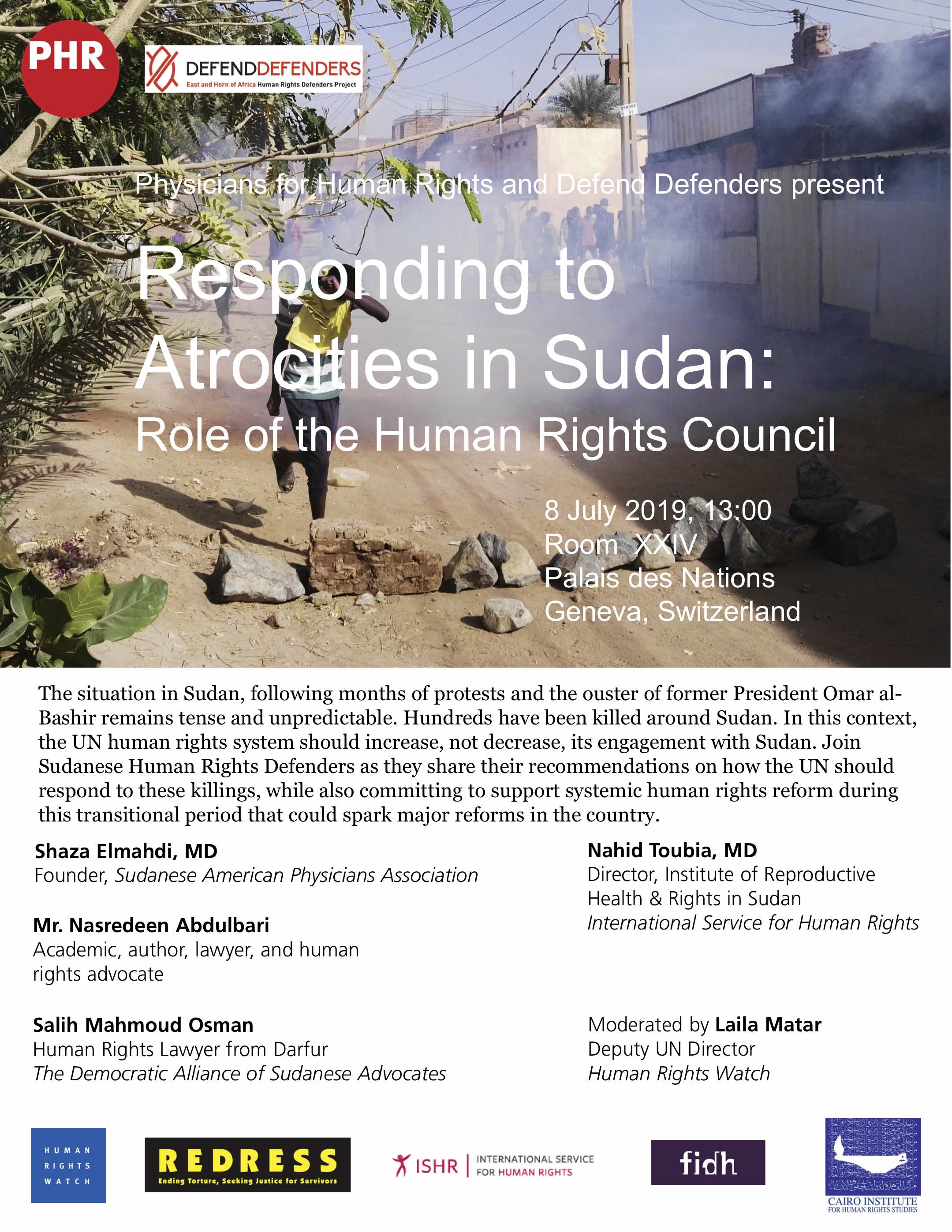CIHRS Activities at the 41st Session of the United Nations Human Rights Council
The Cairo Institute for Human Rights Studies (CIHRS) engaged in the 41st session of the United Nations Human Rights Council, held from 24 June to 12 July 2019 in Geneva, Switzerland. CIHRS’ advocacy centered on seven countries: Palestine, Yemen, Libya, Sudan, Syria, Saudi Arabia and Egypt. At the HRC, CIHRS focused on countering attempts by repressive governments to exploit international mechanisms with the aim of covering up their human rights violations; on ensuring accountability for human rights violators; and on advocating for the release of unjustly detained persons.
Palestine
With the release of the UN database of businesses operating in Israeli settlements now postponed for over three years, CIHRS has increased its engagement with states to request the Office of the United Nations High Commissioner for Human Rights (OHCHR) to fulfill its mandate by publicly releasing the database with the names of companies.
During the 41st session, CIHRS coordinated joint advocacy for the database’s publication, with a Palestinian partner, Al-Haq, a European partner, 11.11.11, a coalition of about 60 Belgian NGOs, unions, movements, and other groups. The organizations met with more than 20 missions in Geneva - comprising states from Africa, Europe, South America - to call for OHCHR’s independence to be protected, and to underscore the importance of fulfilling the mandate. Further delays, CIHRS and its partners warned, could undermine the Office and exacerbate an already-pervasive culture of impunity for human rights abuses and internationally-recognized crimes in the occupied Palestinian territory, by both state and non-state actors including business enterprises.

Panelists raised awareness about the importance of the database’s release from local and international perspectives during a side event organized by CIHRS on 5 July 2019, titled Upholding the rule of law: the UN database on businesses involved in settlements in the OPT. Professor Michael Lynk presented, through video-conference, on the illegality of the annexation and the importance of the UN database as a tool in countering the evolving process of colonization and annexation. The event brought together key representatives of the main local, regional, and international organizations advocating for publication, including Al-Haq, 11.11.11, Amnesty International and Human Rights Watch. More than 20 diplomatic missions attended the event.

During the Council session, CIHRS and partners coordinated joint statements in the HRC highlighting the urgency of releasing the database, following three years of delay.
The organizations[1] called for the immediate public release of the database of businesses operating in Israeli settlements as an important precedent in regulating business activities with transparency and accountability in similar contexts. During the general debate on the situation of Palestine, on 8 July, CIHRS delivered an oral intervention calling on member states to take action supporting the High Commissioner in the prompt implementation of her mandate, without further delay, by backing the joint statement proposed by the state of Palestine, and/or seeking alternative ways to express a principled position on the independence of the High Commissioner and her office, and the need for full implementation of all UN HRC mandates.
[1] CIHRS, Al Haq, Badil and the Women's International League for Peace and Freedom
During the general debate following the presentation of the report of the Working Group on Business and Human Rights, CIHRS’ joint[1] oral intervention addressed the need to develop further guidance or normative development on corporate activities in conflict and post-conflict contexts, including occupation, colonization and reconstruction in line with the UN Guiding Principles on Business and Human Rights (UNGPs).
[1] Al-Haq, Law in the Service of Man, BADIL Resource Center for Palestinian Residency and Refugee Rights, and Women's International League for Peace and Freedom.
In a joint intervention, CIHRS and partners called on the Council and Member States to take serious action to bring to an end to the long-standing impunity granted to Israel. CIHRS spoke out against the discriminatory Jewish Nation State Law passed by the Israeli parliament. With the addition of this law, there are now 66 Israeli laws that discriminate directly or indirectly against Palestinians.
Yemen
In line with the objective of ensuring accountability in Yemen, CIHRS coordinated with partner organization Mwatana for Human Rights to ensure their engagement in the adoption of the UPR recommendations of Yemen under Agenda Item 6. CIHRS and Mwatana delivered a joint oral intervention at the HRC during the adoption of Yemen’s UPR recommendations, on July 4, 2019. The intervention highlighted the persistence of grave violations and called on the government to cooperate fully with the Group of Eminent Experts (GEE) and other international accountability mechanisms to counter the impunity enjoyed thus far by all parties to the conflict.
Libya
In line with the objective of implementing an accountability mechanism in Libya, CIHRS continued its campaign calling for the re-establishment of a Commission of Inquiry (CoI) into the gross human rights violations throughout the country. On 3 July, CIHRS delivered an oral intervention highlighting the ongoing, pervasive impunity in Libya and the proliferation of human rights violations, including war crimes and crimes against humanity. CIHRS called on the Human Rights Council to urgently reestablish the CoI on Libya, which will identify the perpetrators of violations and seek to establish individual criminal responsibility for violations of international law. The Netherlands also advocated for a Commission of Inquiry on Libya during the general debate under Agenda Item 4.

On 4 July, CIHRS participated in a side event organized by Maharat entitled “Ongoing attacks on journalists across the MENA region: The need for the UN HRC to act immediately to ensure the safety of journalists.'' CIHRS discussed the perilous situation of journalists in Libya, based on documentation provided by the Libya Platform, a coalition of NGOs working on the protection and promotion of human rights and public freedoms in Libya. CIHRS emphasized that journalists can only be protected through countering violence and incitement to violence, including hate speech.
Sudan
With the human rights situation in Sudan continually deteriorating since December 2018, and the Sudanese military’s violent dispersal of peaceful protesters in June 2019, during which it committed gross human rights violations, CIHRS’ focus during the 41st session of the Human Rights Council has been the protection of civilians from further violence. To this end, CIHRS together with several organizations have been engaging with the Human Rights Council to take a strong position on Sudan, including by establishing a Commission of Inquiry to investigate the latest attacks on pro-democracy protesters.

The joint statement Killings of Peaceful Sudanese Democracy Protesters Demand Accountability reiterated the call made in January 2019 to dispatch an independent international fact-finding mission to Sudan. Sudanese human rights defenders also called for an international investigative mechanism while discussing the reality on the ground during a side event co-sponsored by CIHRS Responding to Atrocities in Sudan: The Role of the Human Rights Council, held on 8 July 2019.
In an intervention during the Enhanced Interactive Dialogue on Sudan in the HRC, CIHRS called on the international community to closely follow the implementation of the accords between the military and the civilian opposition, and pressure the military authorities to meet their international obligations. CIHRS called on the HRC to urgently establish a mechanism to conduct an independent investigation into the attacks in Sudan since December 2018 and ensure that all perpetrators of serious crimes are held accountable.
Syria
The protection of civilians, particularly in Idlib, was the focal point of CIHRS’ advocacy during the session. CIHRS and its partners called on the United Nations Security Council to demand the OPCW Investigation and Identification Team be given access to investigate the use of toxic chemicals and chemical weapons, in a statement issued on 8 July. This call reinforced CIHRS’ earlier call on the OHCHR to demand access for the investigation team, delivered on 2 July 2019, during the interactive dialogue with the Commission of Inquiry on the Syrian Arab Republic. In this statement, CIHRS appealed to the international community to insist on an immediate cease-fire in concert with pressuring the Syrian and Russian governments to at long last respect international law and meet their international obligations.
Concurrently, CIHRS continued to advocate for guarantees that reconstruction projects in Syria adhere to human rights standards. On 3 July 2019, CIHRS delivered an oral intervention during the general debate following the report of the Forum on Business and Human Rights, highlighting the importance of ensuring that projects in Syria conducted by states and non-state actors (mainly IFIs, UN agencies, and the private sector) do not contribute to human rights abuses or to empowering and enriching the perpetrators of serious human rights violations.
Saudi Arabia
Following a joint campaign on Saudi Arabia, which led to an unprecedented joint statement by 36 states in the 40th session of the Human Rights Council calling for the release of detained women human rights defenders, CIHRS continued to advocate for accountability in Saudi Arabia. In a joint statement Stand up for human rights in Saudi Arabia: States should adopt a resolution at the UN Human Rights Council to address ongoing human rights violations, non-governmental organizations called on the HRC to present a resolution establishing a monitoring mechanism over human rights violations in Saudi Arabia.
Egypt
CIHRS continued its engagement on Egypt to ensure that human rights violations in the country remained on the agenda of the Council. On 2 July CIHRS co-sponsored a side-event, with Civicus, Amnesty International, Article 19 and Salam for Democracy and Human Rights, on “The Human Rights Problem of Political Marginalization.” CIHRS described how the sustained, systematic denial of basic civil and political rights and freedoms in Egypt is criminalizing peaceful political dissent while the country remains plagued by historically high levels of political violence. CIHRS brought attention to the latest arbitrary wave of arrests, which targeted former parliamentarian Zyad El-Eleaimy, and journalists and activists including Hossam Mo’anes, Hisham Fouad, Ahmed Tammam, Omar el-Shenety, Hassan al-Barbary. CIHRS highlighted the government’s relentless crackdown to eliminate all forms of dissent, free expression and association, and civil society activity in Egypt, often under the guise of “counterterrorism.”
Cross-regional
- On Eritrea: CIHRS joined NGOs in a letter calling for the adoption of a resolution to maintain a monitoring and reporting mandate on the human rights situation in Eritrea.
- To counter the attacks on the UN system, including the special procedures, CIHRS joined an intervention in the Human Rights Council to send a strong message against the escalation of reprisals against Special Procedures mandate holders and members of Expert Mechanisms and Commissions of Inquiry (CoI) by States, including members of the Council, as well as threats against the Special Procedures system as a whole. CIHRS also joined an open letter regarding the critical funding gap affecting UN human rights mechanisms and the Office of the High Commissioner for Human Rights.
Share this Post

